
tutorials
This is a repo for all the tutorials put out by H2O.ai. This includes learning paths for Driverless AI, H2O-3, Sparkling Water and more...
Stars: 129
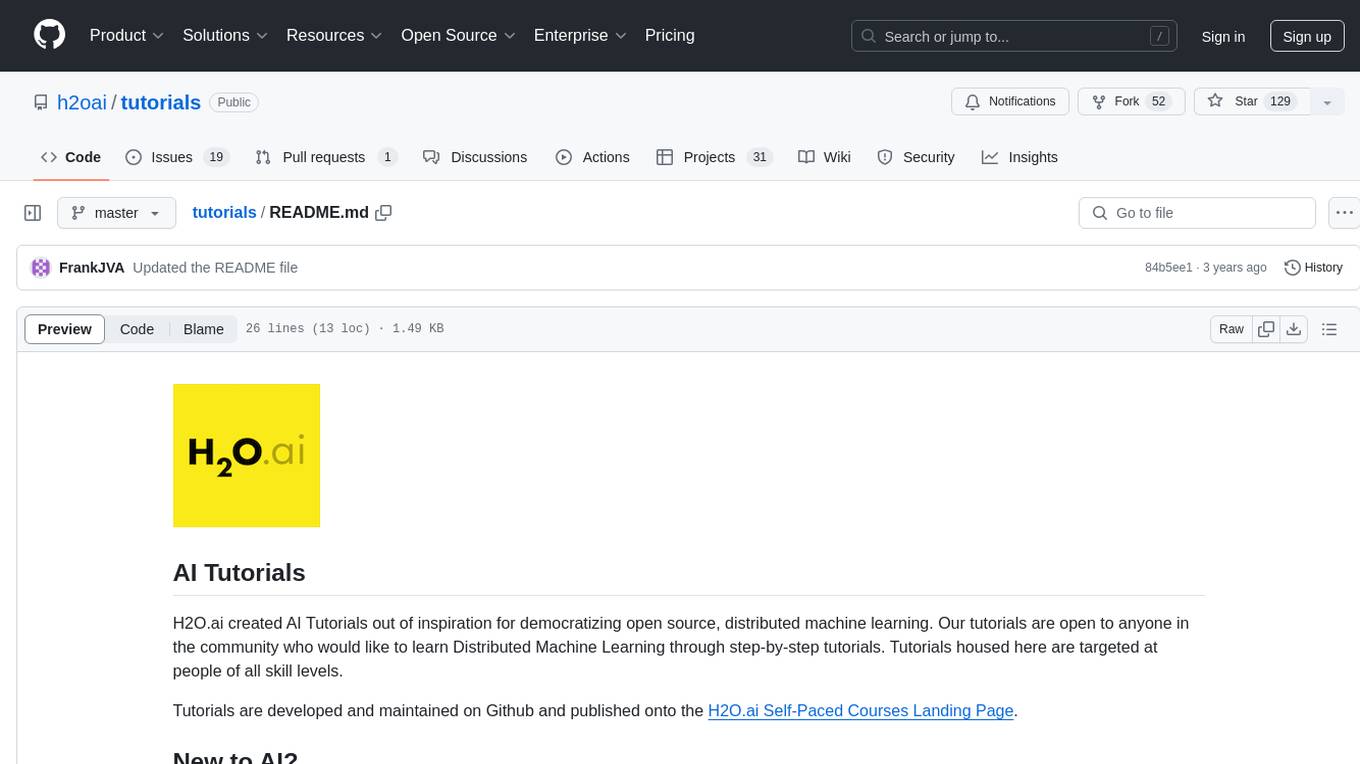
H2O.ai's AI Tutorials aim to democratize open source, distributed machine learning by providing step-by-step tutorials for individuals of all skill levels. These tutorials are developed and maintained on Github and published on the H2O.ai Self-Paced Courses Landing Page. Users can begin their AI journey by exploring the tutorials available on the landing page and can contribute by fixing issues, updating tutorials, or creating new ones.
README:
H2O.ai created AI Tutorials out of inspiration for democratizing open source, distributed machine learning. Our tutorials are open to anyone in the community who would like to learn Distributed Machine Learning through step-by-step tutorials. Tutorials housed here are targeted at people of all skill levels.
Tutorials are developed and maintained on Github and published onto the H2O.ai Self-Paced Courses Landing Page.
Begin your journey by browsing the tutorials in the H2O.ai Self-Paced Courses Landing Page
If you are certain there is an issue with the tutorial, please create a new issue on Github, and we will do our best to resolve it.
Fix issues, help clarify topics, update a tutorial to be compatible with the newest releases, or even create a brand new tutorial!
If you'd rather suggest changes or fixes to make, or if you have an idea for a new tutorial you'd like to see, feel free to create a new issue, and a community member will check it out.
For Tasks:
Click tags to check more tools for each tasksFor Jobs:
Alternative AI tools for tutorials
Similar Open Source Tools

tutorials
H2O.ai's AI Tutorials aim to democratize open source, distributed machine learning by providing step-by-step tutorials for individuals of all skill levels. These tutorials are developed and maintained on Github and published on the H2O.ai Self-Paced Courses Landing Page. Users can begin their AI journey by exploring the tutorials available on the landing page and can contribute by fixing issues, updating tutorials, or creating new ones.
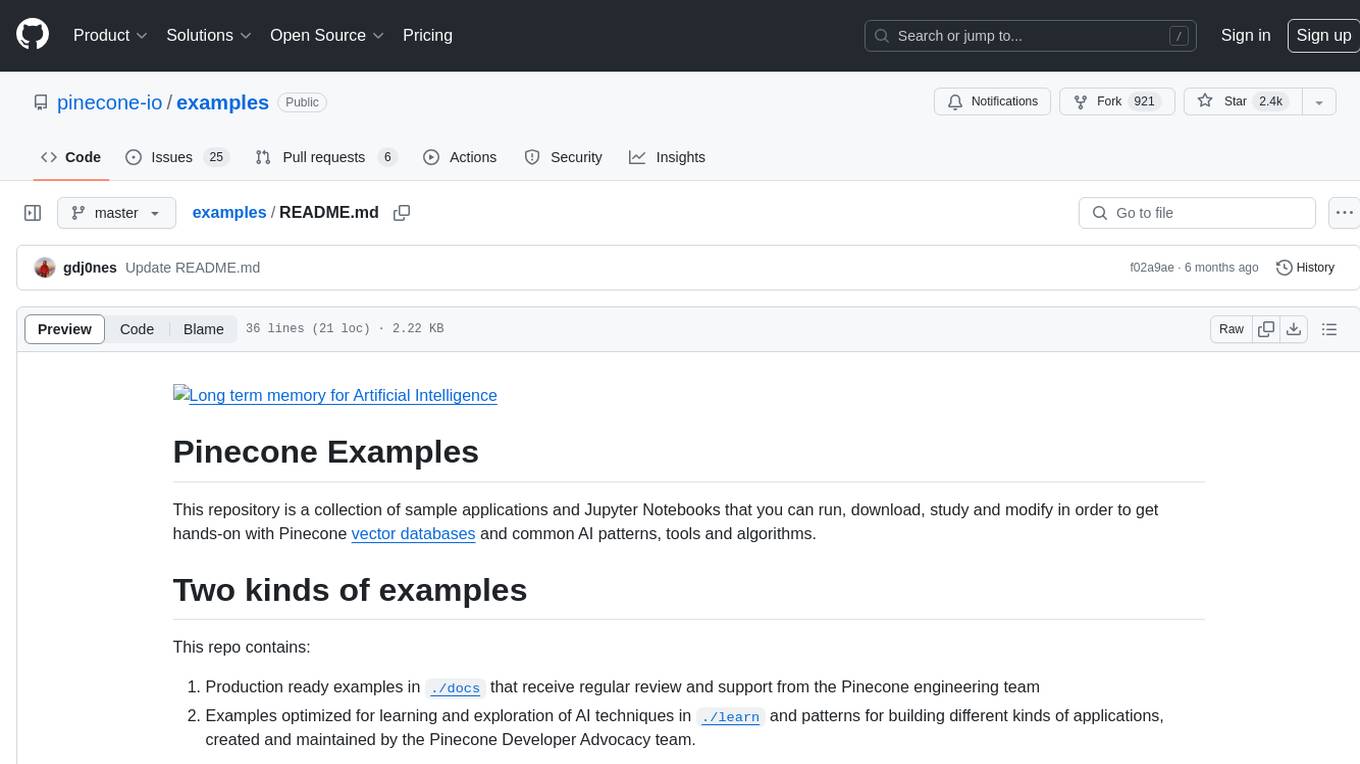
examples
This repository contains a collection of sample applications and Jupyter Notebooks for hands-on experience with Pinecone vector databases and common AI patterns, tools, and algorithms. It includes production-ready examples for review and support, as well as learning-optimized examples for exploring AI techniques and building applications. Users can contribute, provide feedback, and collaborate to improve the resource.
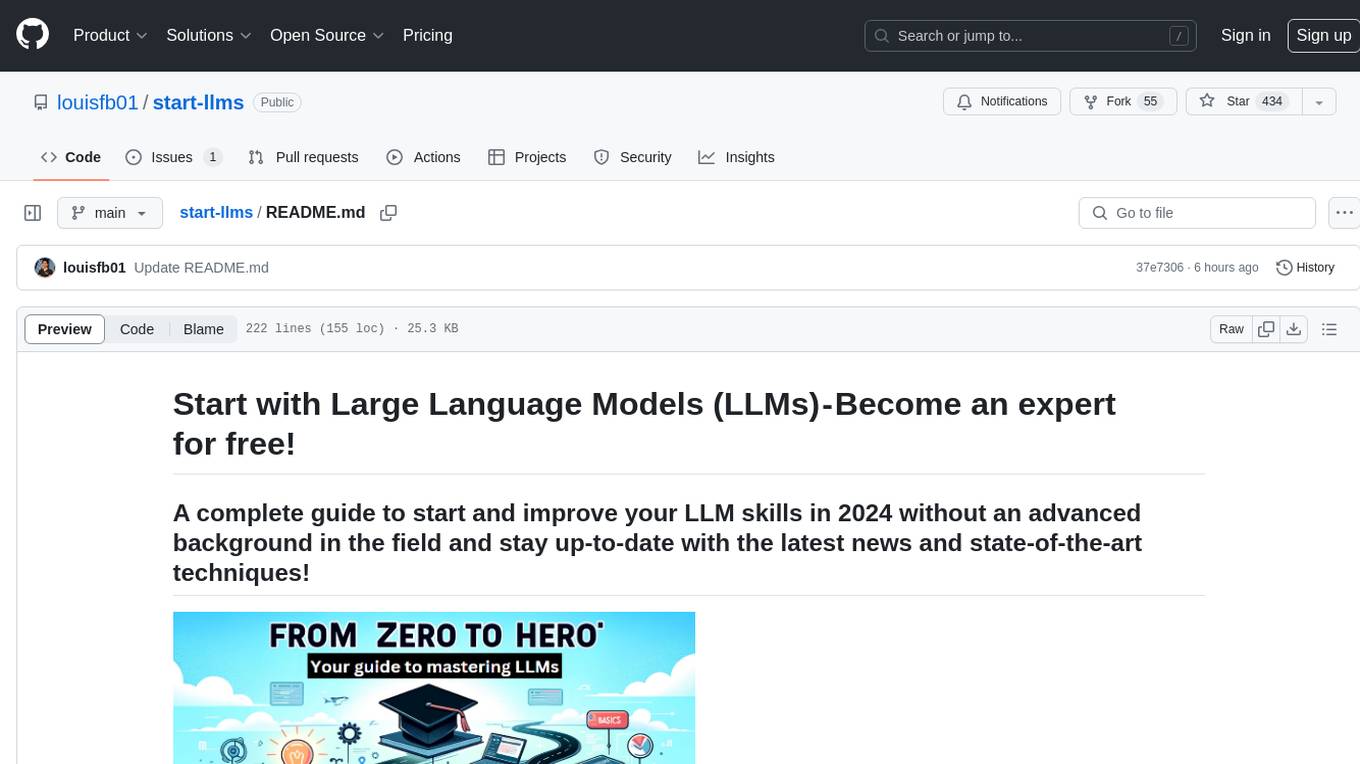
start-llms
This repository is a comprehensive guide for individuals looking to start and improve their skills in Large Language Models (LLMs) without an advanced background in the field. It provides free resources, online courses, books, articles, and practical tips to become an expert in machine learning. The guide covers topics such as terminology, transformers, prompting, retrieval augmented generation (RAG), and more. It also includes recommendations for podcasts, YouTube videos, and communities to stay updated with the latest news in AI and LLMs.
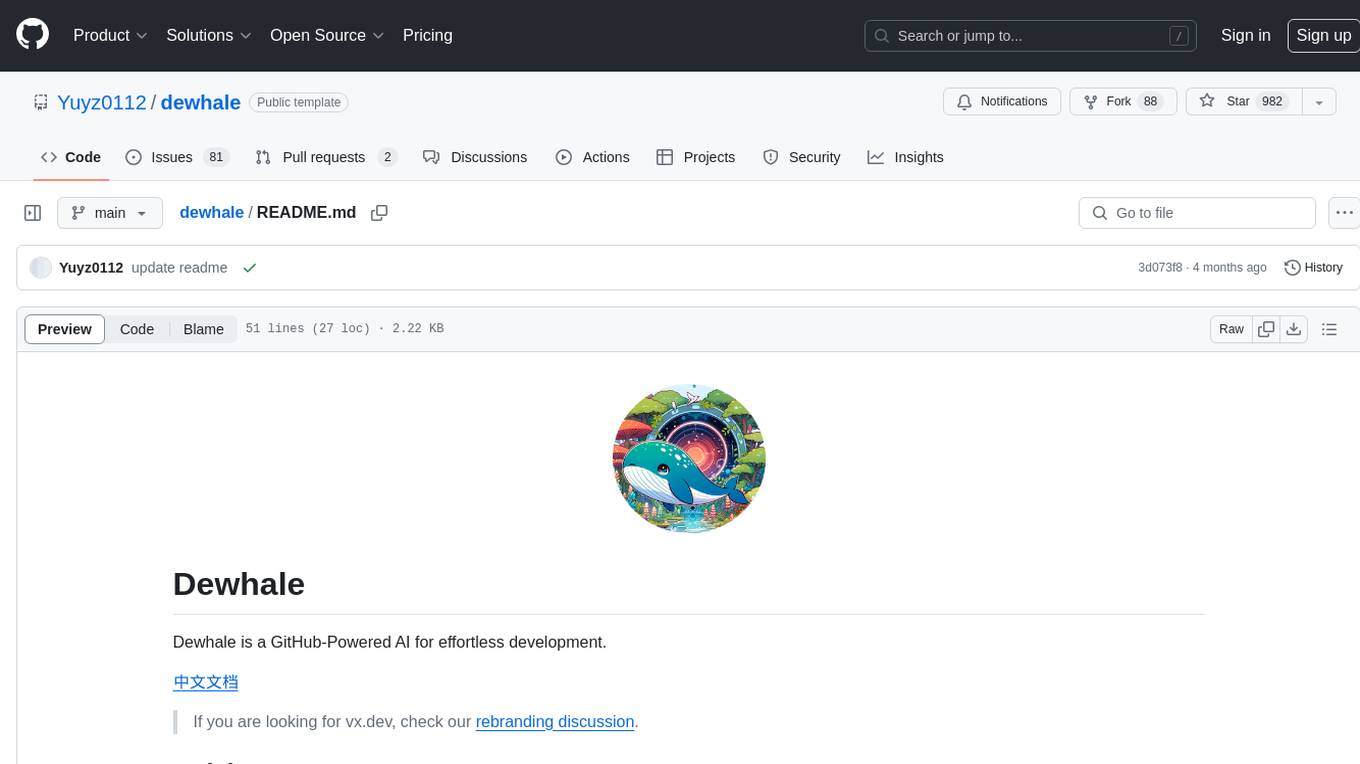
dewhale
Dewhale is a GitHub-Powered AI tool designed for effortless development. It utilizes prompt engineering techniques under the GPT-4 model to issue commands, allowing users to generate code with lower usage costs and easy customization. The tool seamlessly integrates with GitHub, providing version control, code review, and collaborative features. Users can join discussions on the design philosophy of Dewhale and explore detailed instructions and examples for setting up and using the tool.
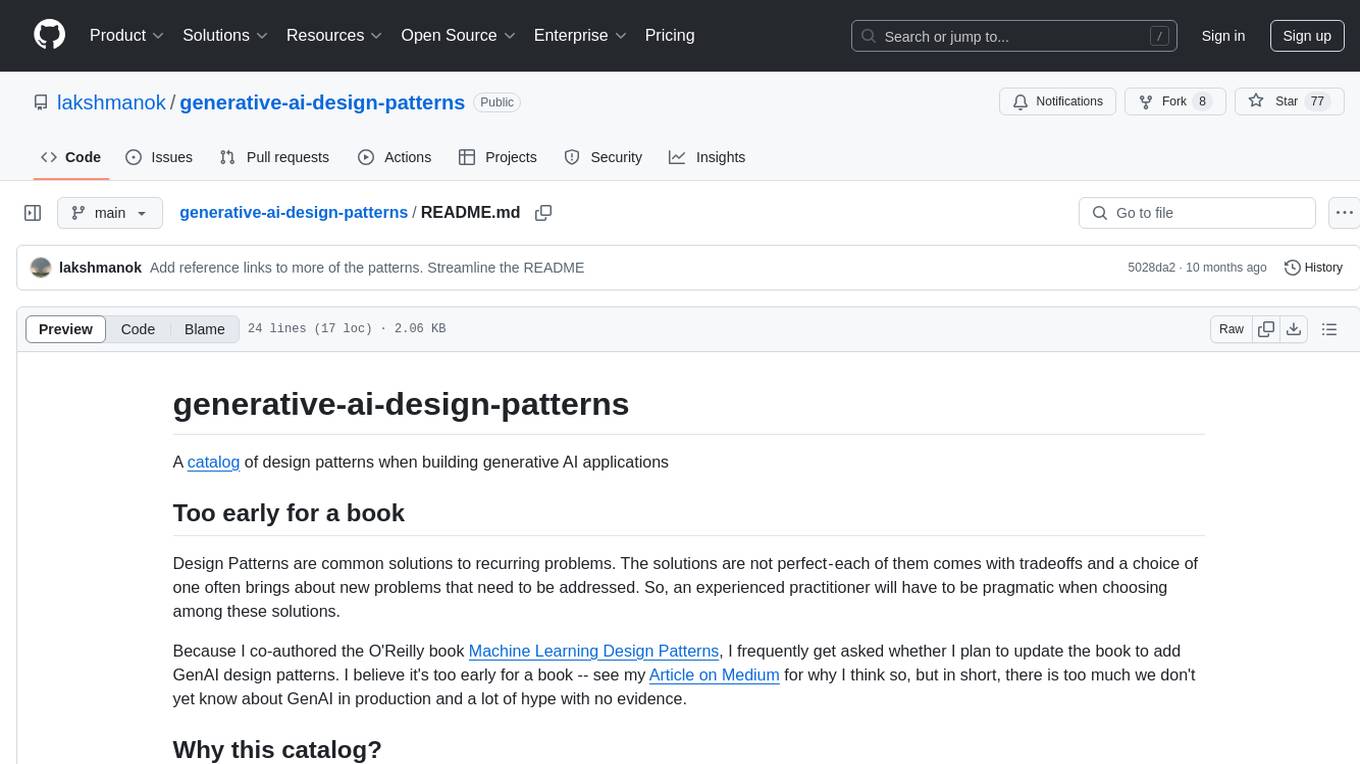
generative-ai-design-patterns
A catalog of design patterns for building generative AI applications, capturing current best practices in the field. The repository serves as a living catalog on GitHub to help practitioners navigate through the noise and identify areas for improvement. It is too early for a book due to the evolving nature of generative AI in production and the lack of concrete evidence to support certain claims.
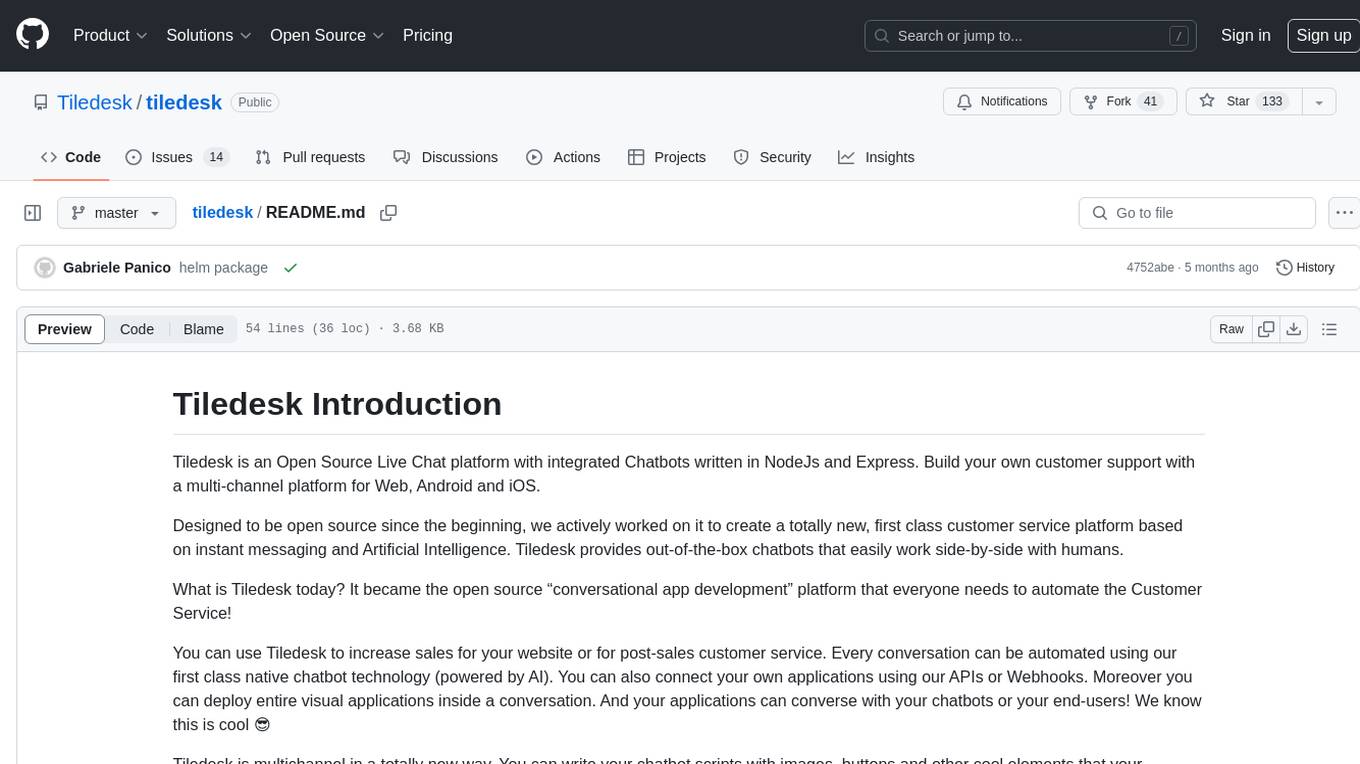
tiledesk
Tiledesk is an Open Source Live Chat platform with integrated Chatbots written in NodeJs and Express. It provides a multi-channel platform for Web, Android, and iOS, offering out-of-the-box chatbots that work alongside humans. Users can automate conversations using native chatbot technology powered by AI, connect applications via APIs or Webhooks, deploy visual applications within conversations, and enable applications to interact with chatbots or end-users. Tiledesk is multichannel, allowing chatbot scripts with images and buttons to run on various channels like Whatsapp, Facebook Messenger, and Telegram. The project includes Tiledesk Server, Dashboard, Design Studio, Chat21 ionic, Web Widget, Server, Http Server, MongoDB, and a proxy. It offers Helm charts for Kubernetes deployment, but customization is recommended for production environments, such as integrating with external MongoDB or monitoring/logging tools. Enterprise customers can request private Docker images by contacting [email protected].
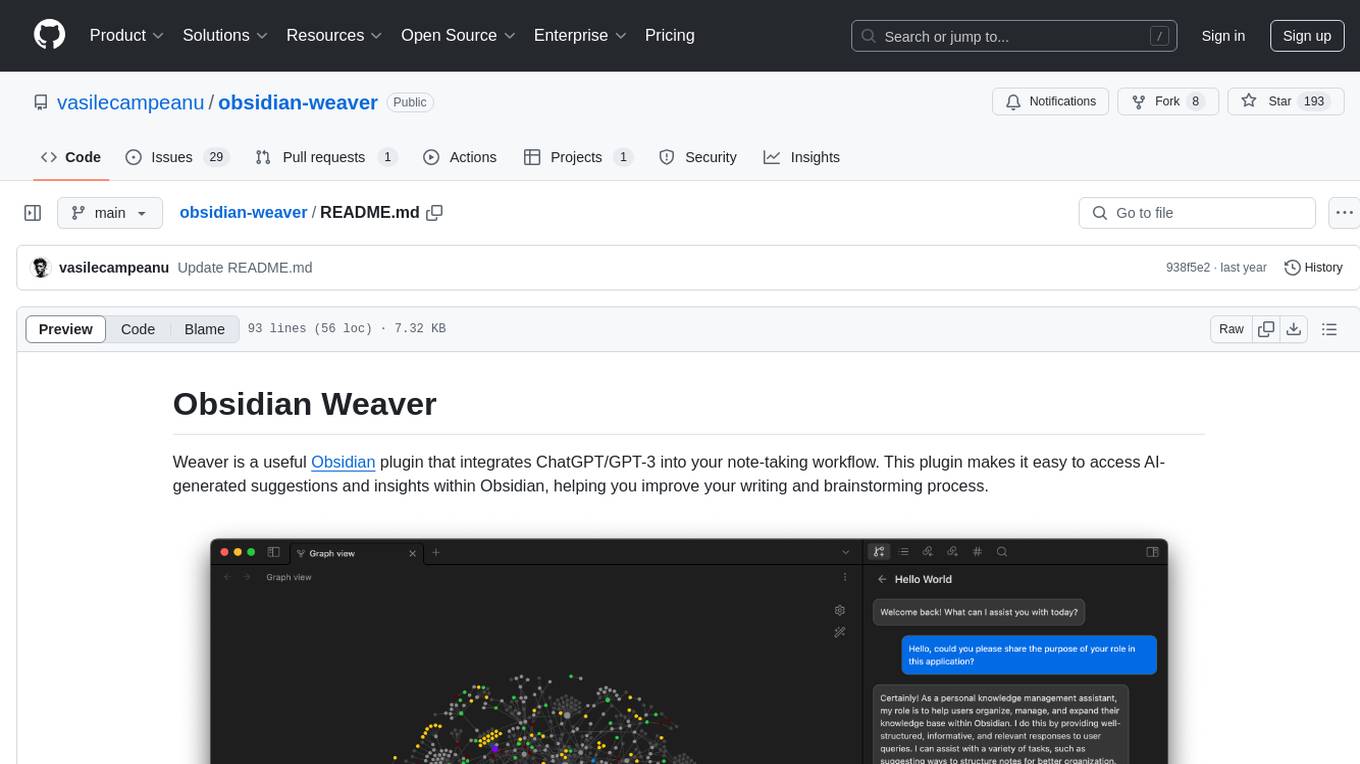
obsidian-weaver
Obsidian Weaver is a plugin that integrates ChatGPT/GPT-3 into the note-taking workflow of Obsidian. It allows users to easily access AI-generated suggestions and insights within Obsidian, enhancing the writing and brainstorming process. The plugin respects Obsidian's philosophy of storing notes locally, ensuring data security and privacy. Weaver offers features like creating new chat sessions with the AI assistant and receiving instant responses, all within the Obsidian environment. It provides a seamless integration with Obsidian's interface, making the writing process efficient and helping users stay focused. The plugin is constantly being improved with new features and updates to enhance the note-taking experience.
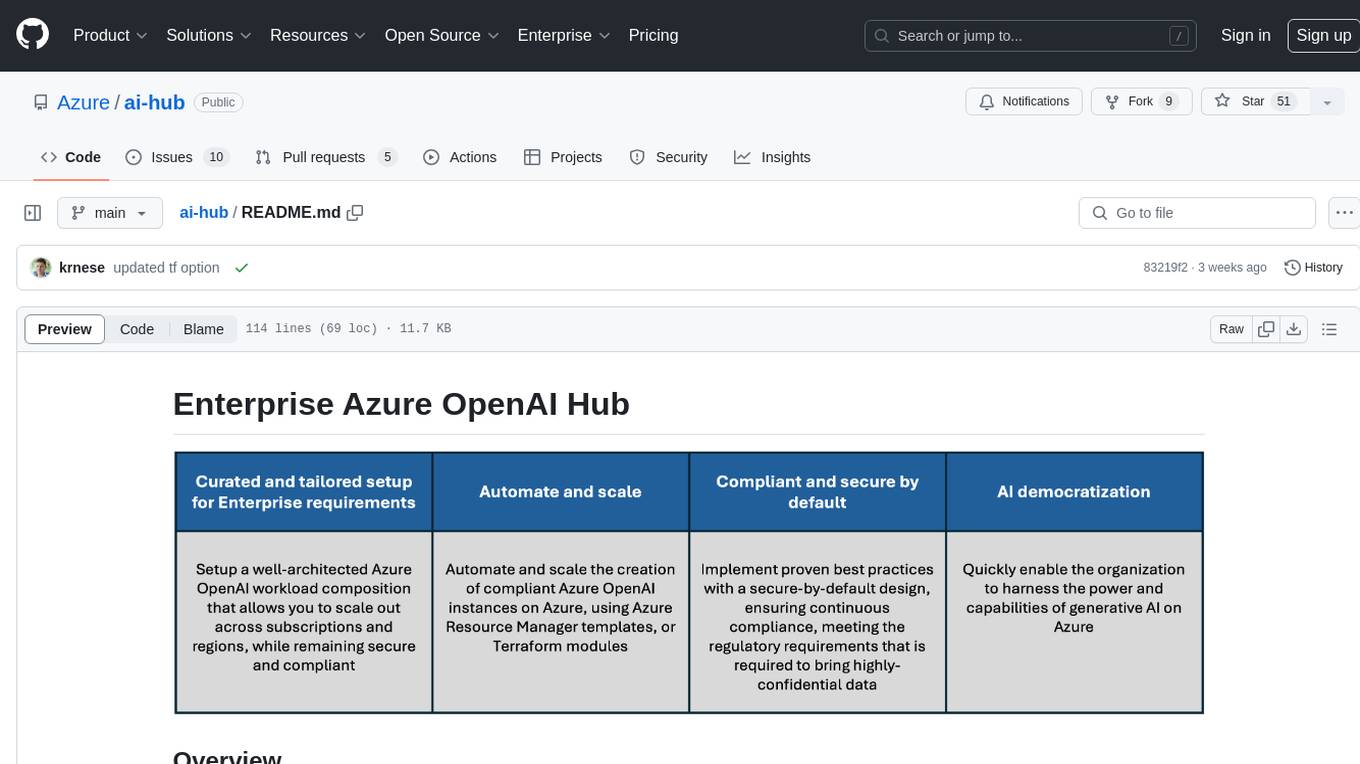
ai-hub
The Enterprise Azure OpenAI Hub is a comprehensive repository designed to guide users through the world of Generative AI on the Azure platform. It offers a structured learning experience to accelerate the transition from concept to production in an Enterprise context. The hub empowers users to explore various use cases with Azure services, ensuring security and compliance. It provides real-world examples and playbooks for practical insights into solving complex problems and developing cutting-edge AI solutions. The repository also serves as a library of proven patterns, aligning with industry standards and promoting best practices for secure and compliant AI development.
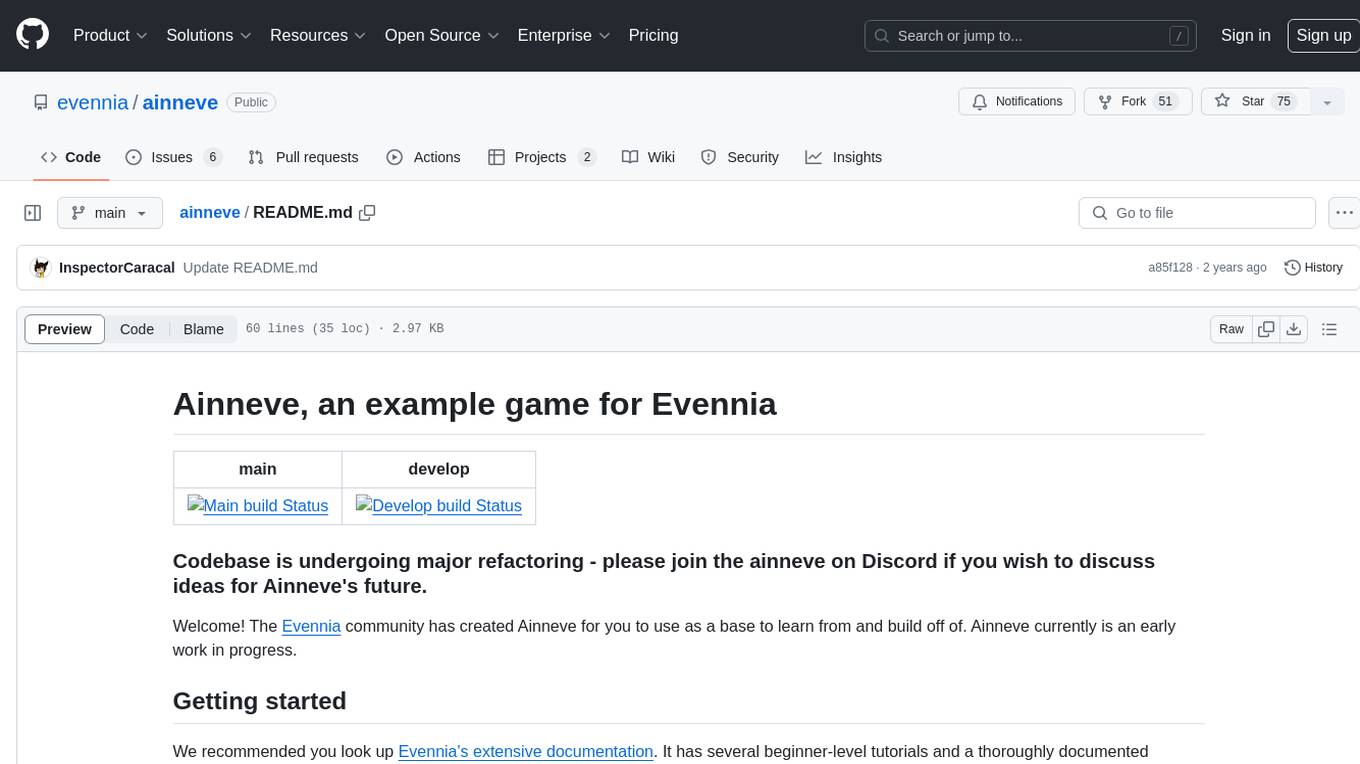
ainneve
Ainneve is an example game for Evennia, created by the Evennia community as a base for learning and building off of. It is currently in early development stages and undergoing major refactoring. The game provides a starting point for users to explore game systems and world settings, with extensive documentation available. Installation is straightforward, with pre-configured settings and clear instructions for setting up and starting the server. The project welcomes contributions and offers opportunities for users to get involved by checking open issues and joining the community Discord channel. Ainneve is licensed under the BSD license.
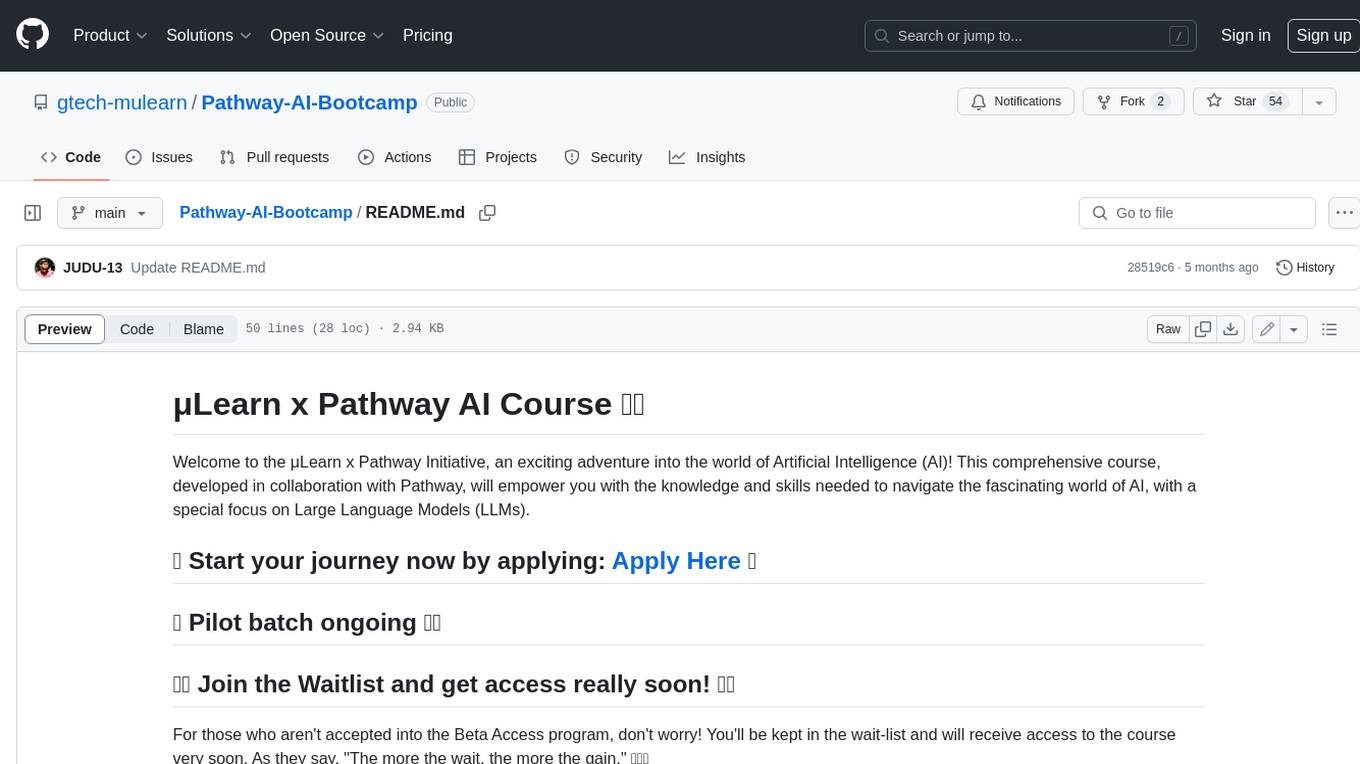
Pathway-AI-Bootcamp
Welcome to the μLearn x Pathway Initiative, an exciting adventure into the world of Artificial Intelligence (AI)! This comprehensive course, developed in collaboration with Pathway, will empower you with the knowledge and skills needed to navigate the fascinating world of AI, with a special focus on Large Language Models (LLMs).
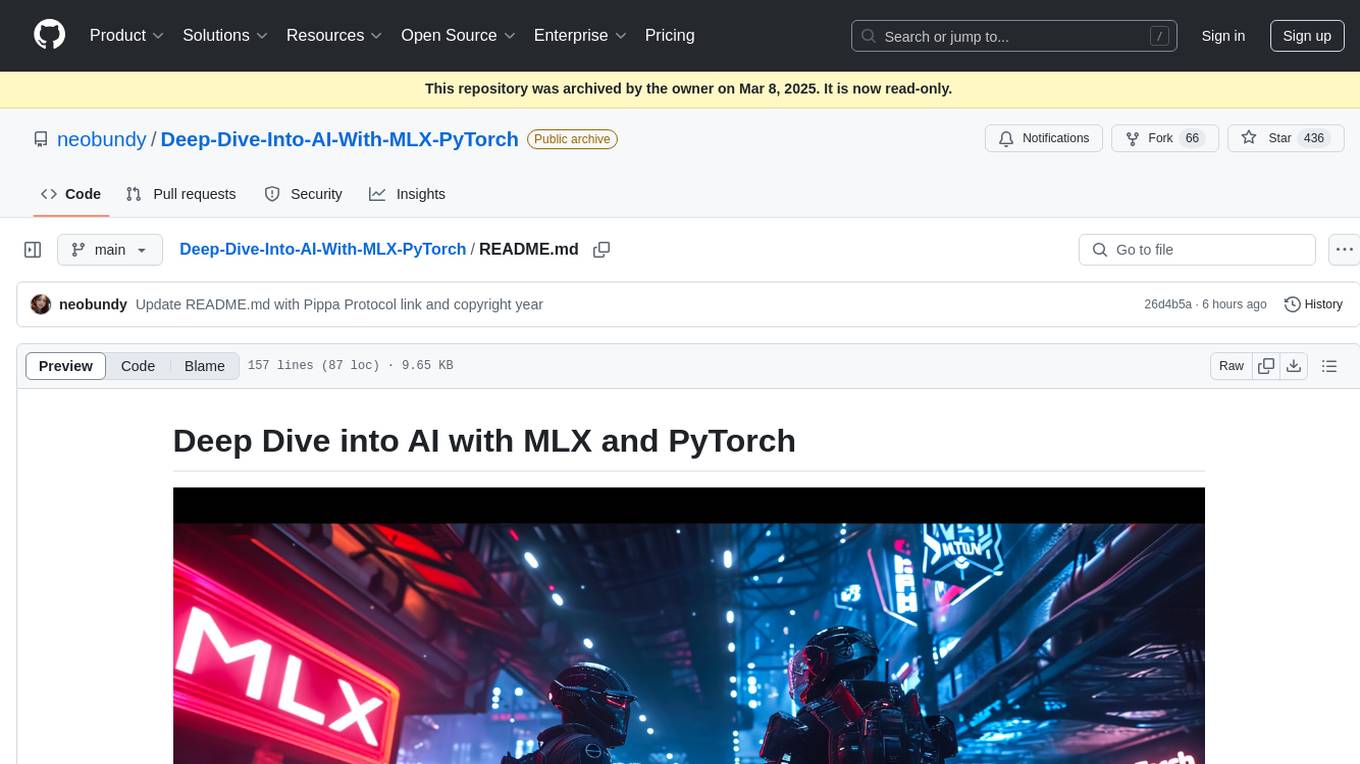
Deep-Dive-Into-AI-With-MLX-PyTorch
Deep Dive into AI with MLX and PyTorch is an educational initiative focusing on AI, machine learning, and deep learning using Apple's MLX and Meta's PyTorch frameworks. The repository contains comprehensive guides, in-depth analyses, and resources for learning and exploring AI concepts. It aims to cater to audiences ranging from beginners to experienced individuals, providing detailed explanations, examples, and translations between PyTorch and MLX. The project emphasizes open-source contributions, knowledge sharing, and continuous learning in the field of AI.
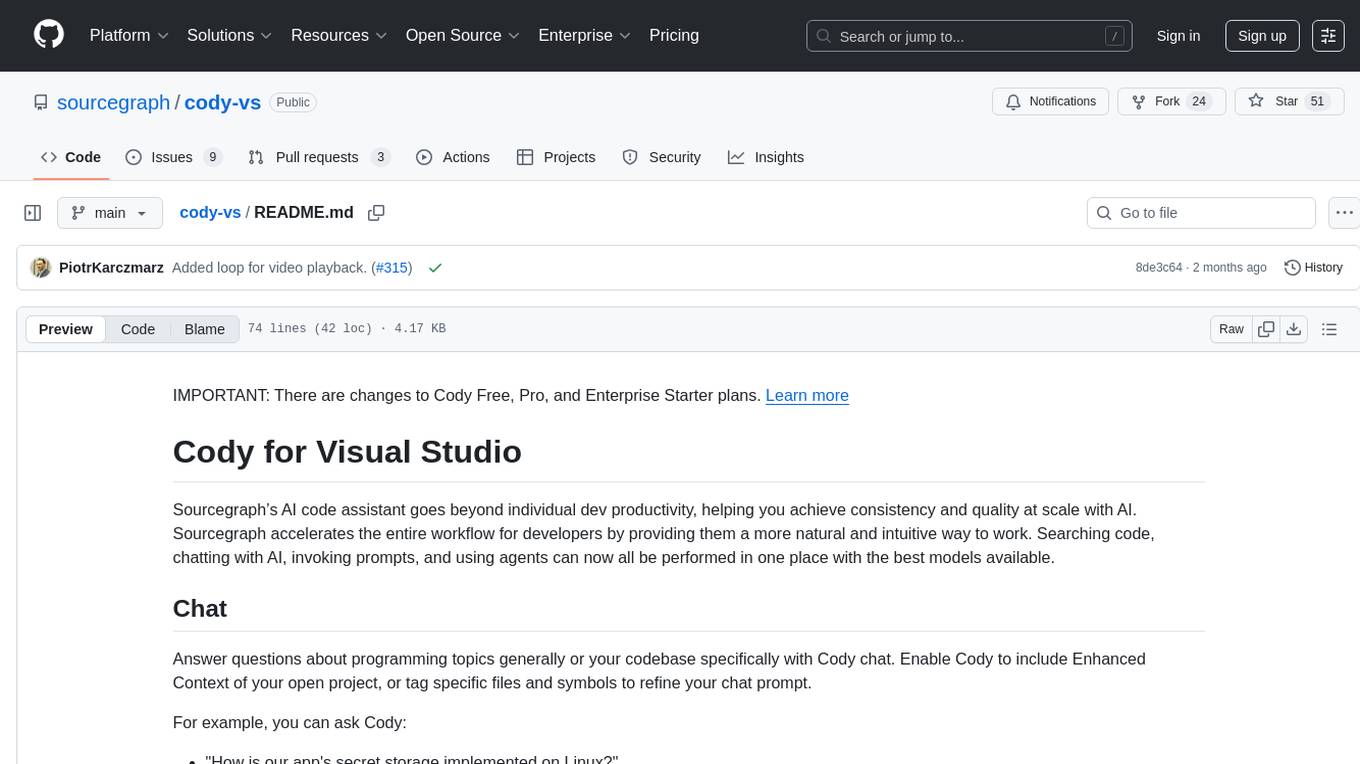
cody-vs
Sourcegraph’s AI code assistant, Cody for Visual Studio, enhances developer productivity by providing a natural and intuitive way to work. It offers features like chat, auto-edit, prompts, and works with various IDEs. Cody focuses on team productivity, offering whole codebase context and shared prompts for consistency. Users can choose from different LLM models like Claude, Gemini Pro, and OpenAI's GPT. Engineered for enterprise use, Cody supports flexible deployment and enterprise security. Suitable for any programming language, Cody excels with Python, Go, JavaScript, and TypeScript code.
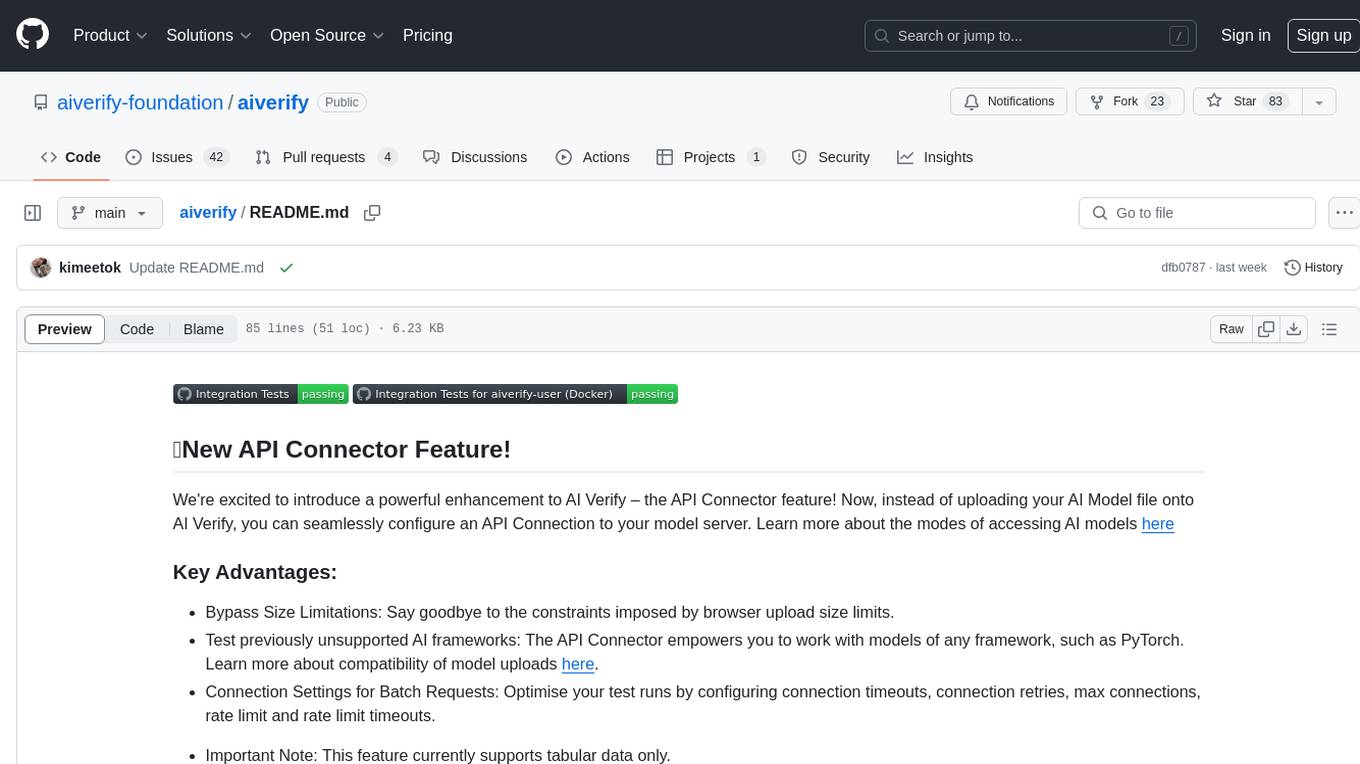
aiverify
AI Verify is an AI governance testing framework and software toolkit that validates the performance of AI systems against internationally recognised principles through standardised tests. It offers a new API Connector feature to bypass size limitations, test various AI frameworks, and configure connection settings for batch requests. The toolkit operates within an enterprise environment, conducting technical tests on common supervised learning models for tabular and image datasets. It does not define AI ethical standards or guarantee complete safety from risks or biases.
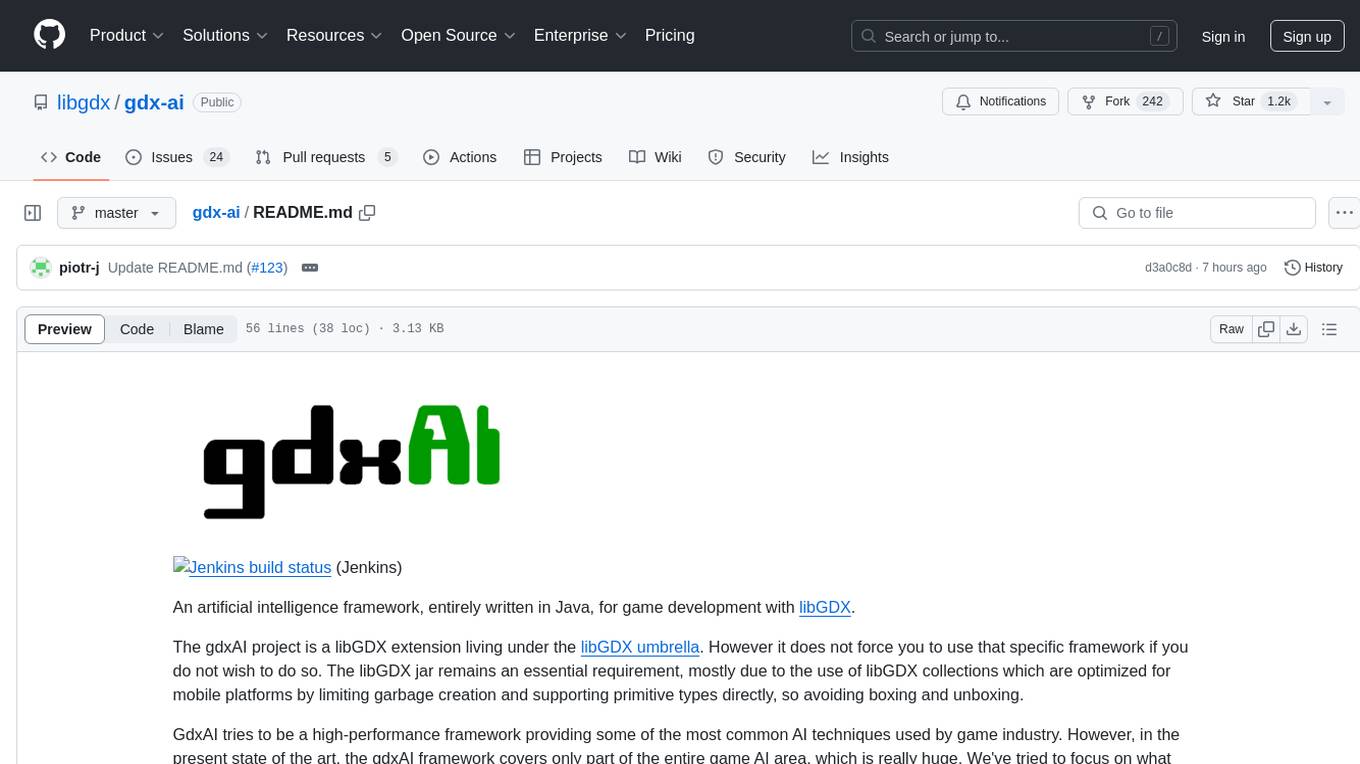
gdx-ai
An artificial intelligence framework entirely written in Java for game development with libGDX. It is a high-performance framework providing common AI techniques used in the game industry, covering movement AI, pathfinding, decision making, and infrastructure. The framework is designed to be used with libGDX but can be used independently. Current features include steering behaviors, formation motion, A* pathfinding, hierarchical pathfinding, behavior trees, state machine, message handling, and scheduling.
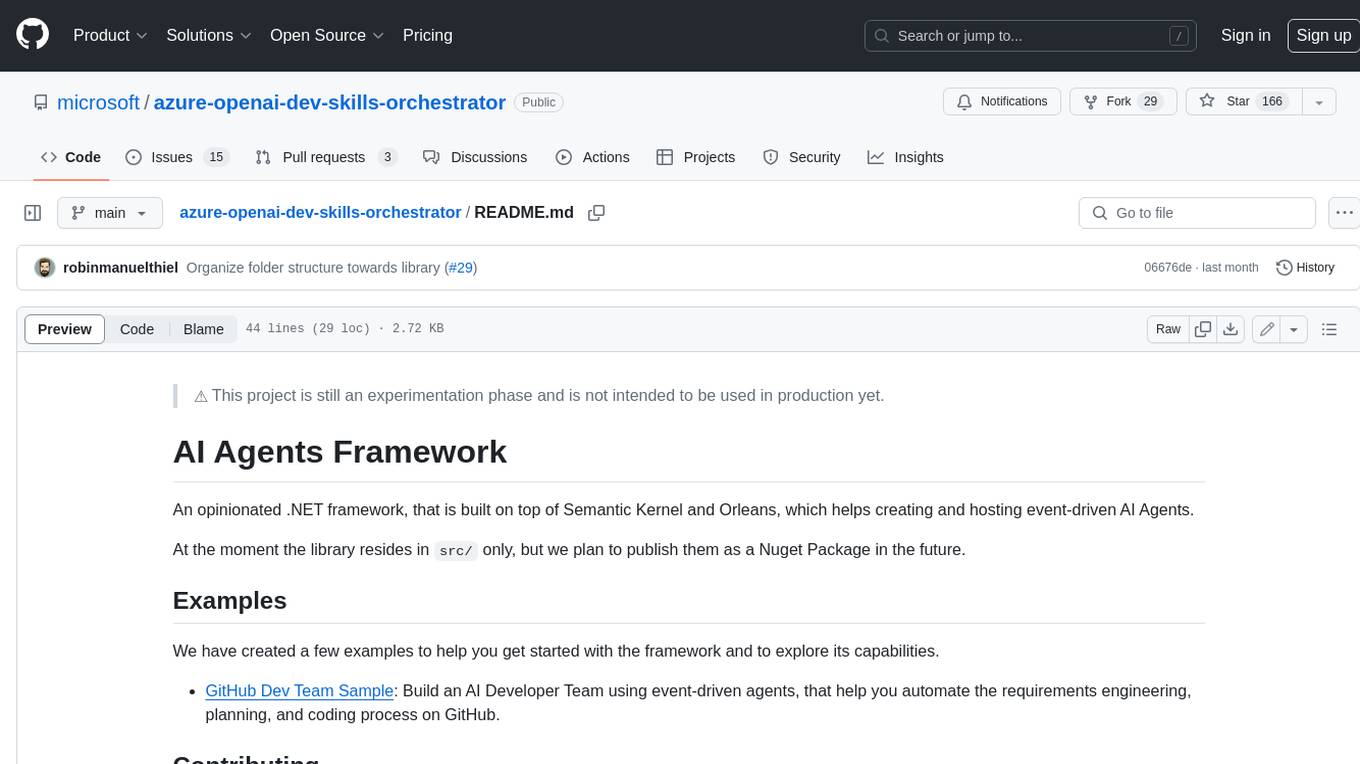
azure-openai-dev-skills-orchestrator
An opinionated .NET framework, that is built on top of Semantic Kernel and Orleans, which helps creating and hosting event-driven AI Agents.
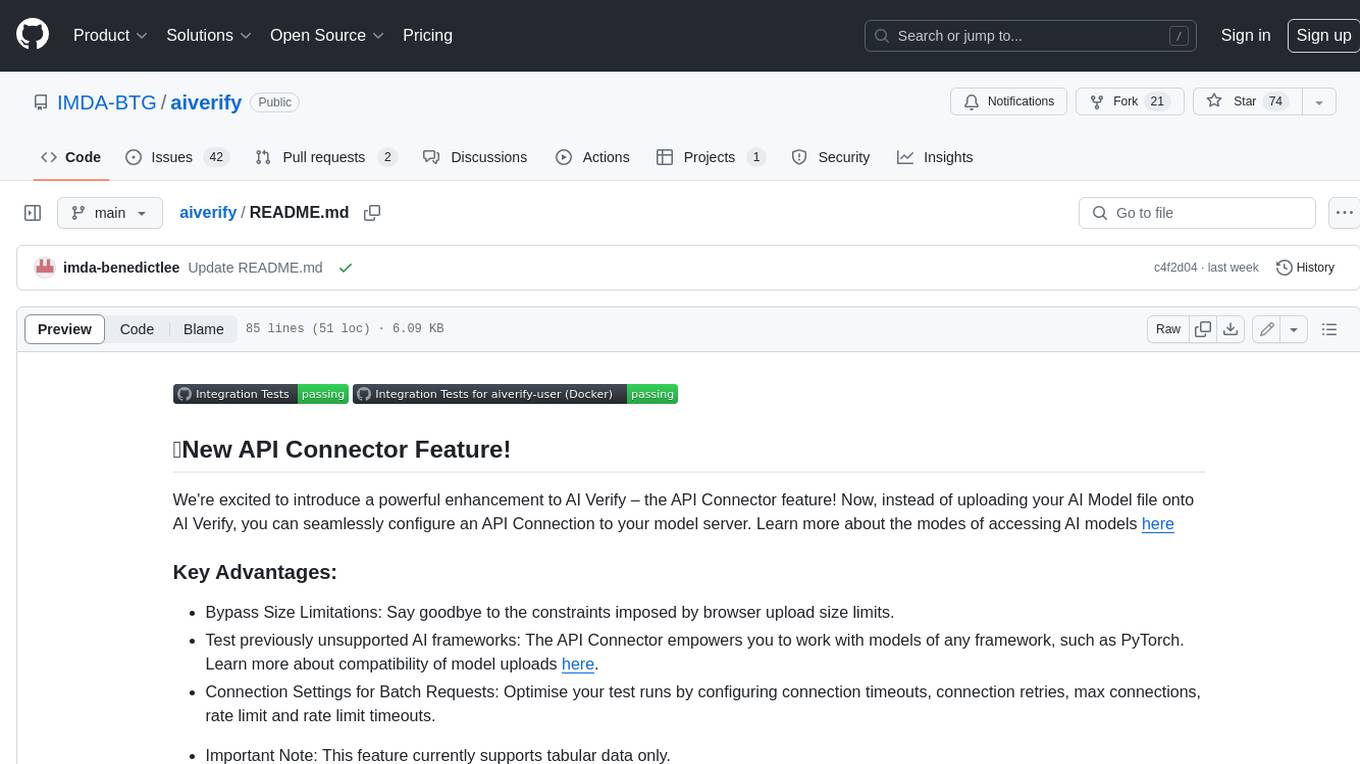
aiverify
AI Verify is an AI governance testing framework and software toolkit that validates the performance of AI systems against a set of internationally recognised principles through standardised tests. AI Verify is consistent with international AI governance frameworks such as those from European Union, OECD and Singapore. It is a single integrated toolkit that operates within an enterprise environment. It can perform technical tests on common supervised learning classification and regression models for most tabular and image datasets. It however does not define AI ethical standards and does not guarantee that any AI system tested will be free from risks or biases or is completely safe.
For similar tasks

tutorials
H2O.ai's AI Tutorials aim to democratize open source, distributed machine learning by providing step-by-step tutorials for individuals of all skill levels. These tutorials are developed and maintained on Github and published on the H2O.ai Self-Paced Courses Landing Page. Users can begin their AI journey by exploring the tutorials available on the landing page and can contribute by fixing issues, updating tutorials, or creating new ones.
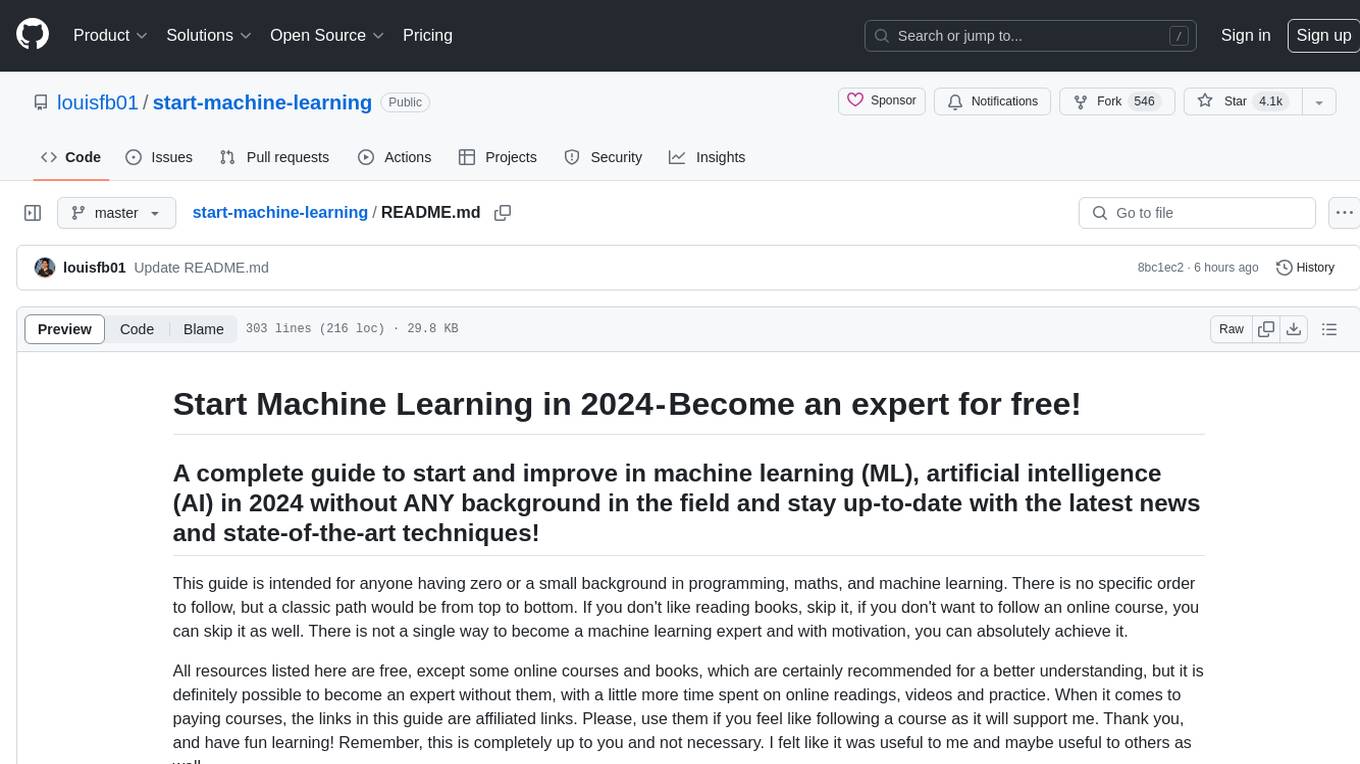
start-machine-learning
Start Machine Learning in 2024 is a comprehensive guide for beginners to advance in machine learning and artificial intelligence without any prior background. The guide covers various resources such as free online courses, articles, books, and practical tips to become an expert in the field. It emphasizes self-paced learning and provides recommendations for learning paths, including videos, podcasts, and online communities. The guide also includes information on building language models and applications, practicing through Kaggle competitions, and staying updated with the latest news and developments in AI. The goal is to empower individuals with the knowledge and resources to excel in machine learning and AI.
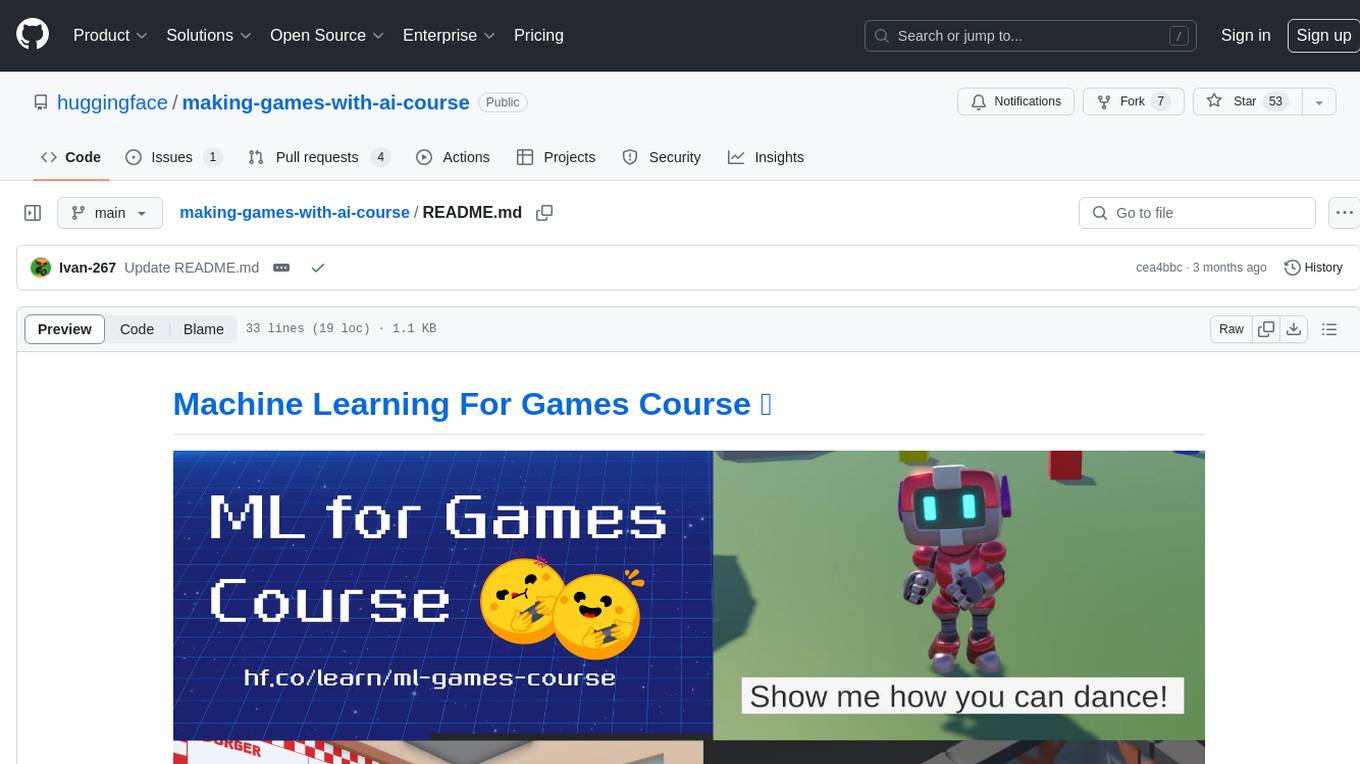
making-games-with-ai-course
This repository hosts the Machine Learning for Games Course, providing mdx files and notebooks for learning. The course covers various topics related to applying machine learning techniques in game development. It offers a syllabus and resources for users to sign up and access the content for free. The project is maintained by Thomas Simonini and is available on GitHub for citation in publications.
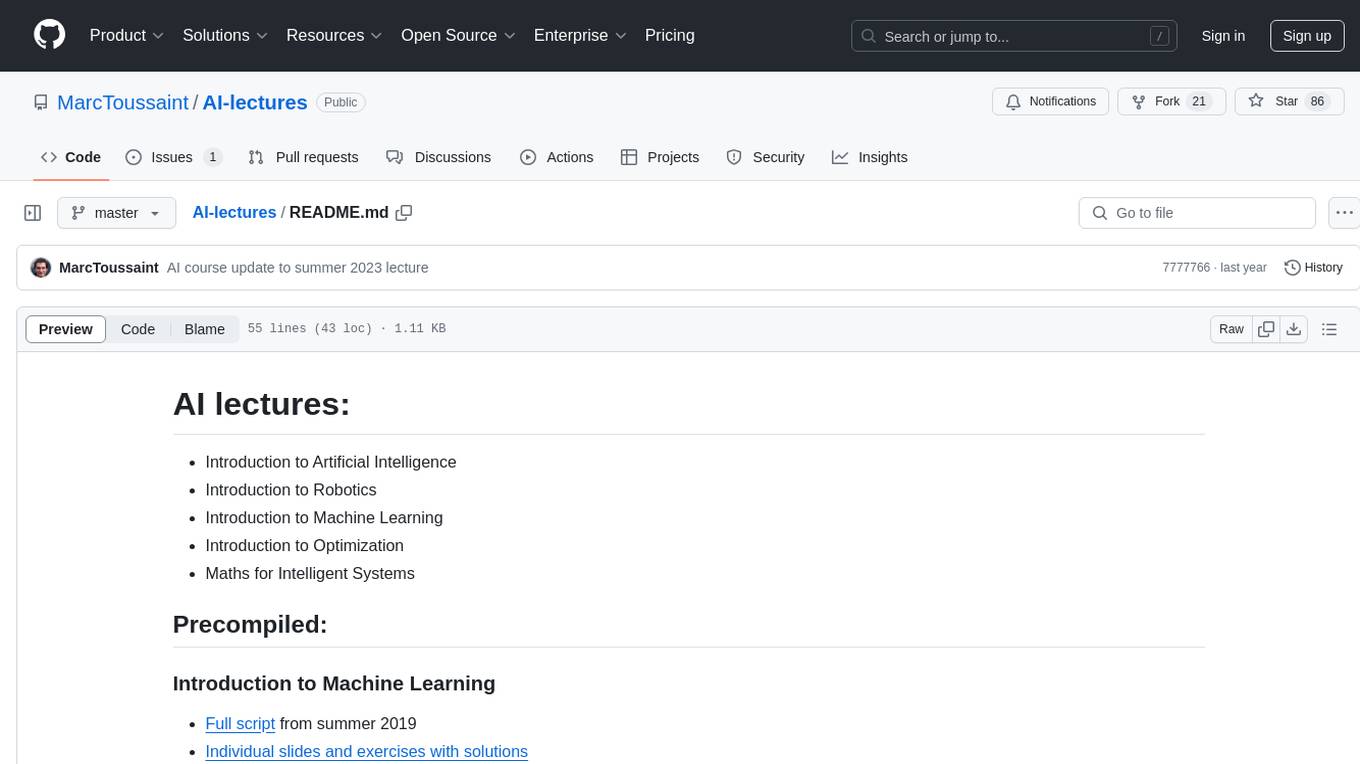
AI-lectures
AI-lectures is a repository containing educational materials on various topics related to Artificial Intelligence, including Machine Learning, Robotics, and Optimization. It provides full scripts, slides, and exercises with solutions for different lectures. Users can compile the materials into PDFs for easy access and reference. The repository aims to offer comprehensive resources for individuals interested in learning about AI and its applications in intelligent systems.
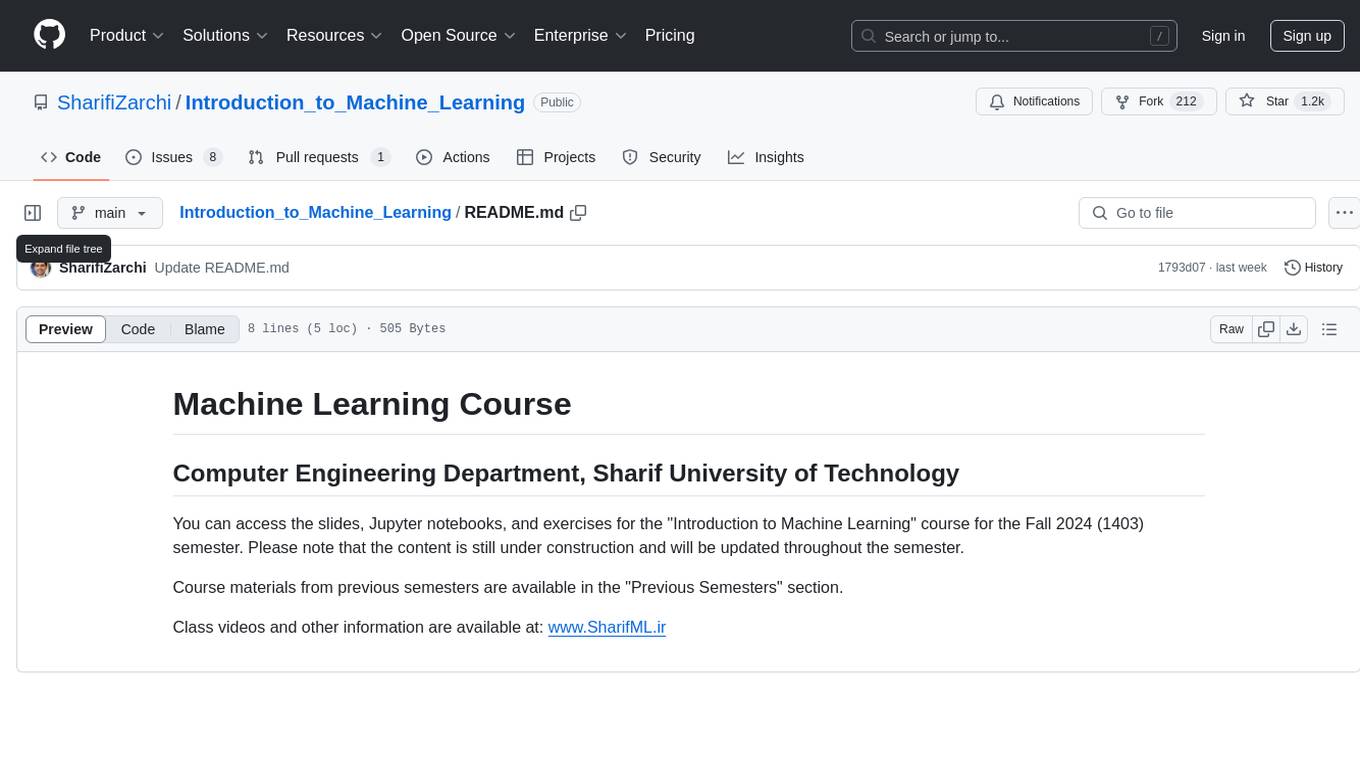
Introduction_to_Machine_Learning
This repository contains course materials for the 'Introduction to Machine Learning' course at Sharif University of Technology. It includes slides, Jupyter notebooks, and exercises for the Fall 2024 semester. The content is continuously updated throughout the semester. Previous semester materials are also accessible. Visit www.SharifML.ir for class videos and additional information.
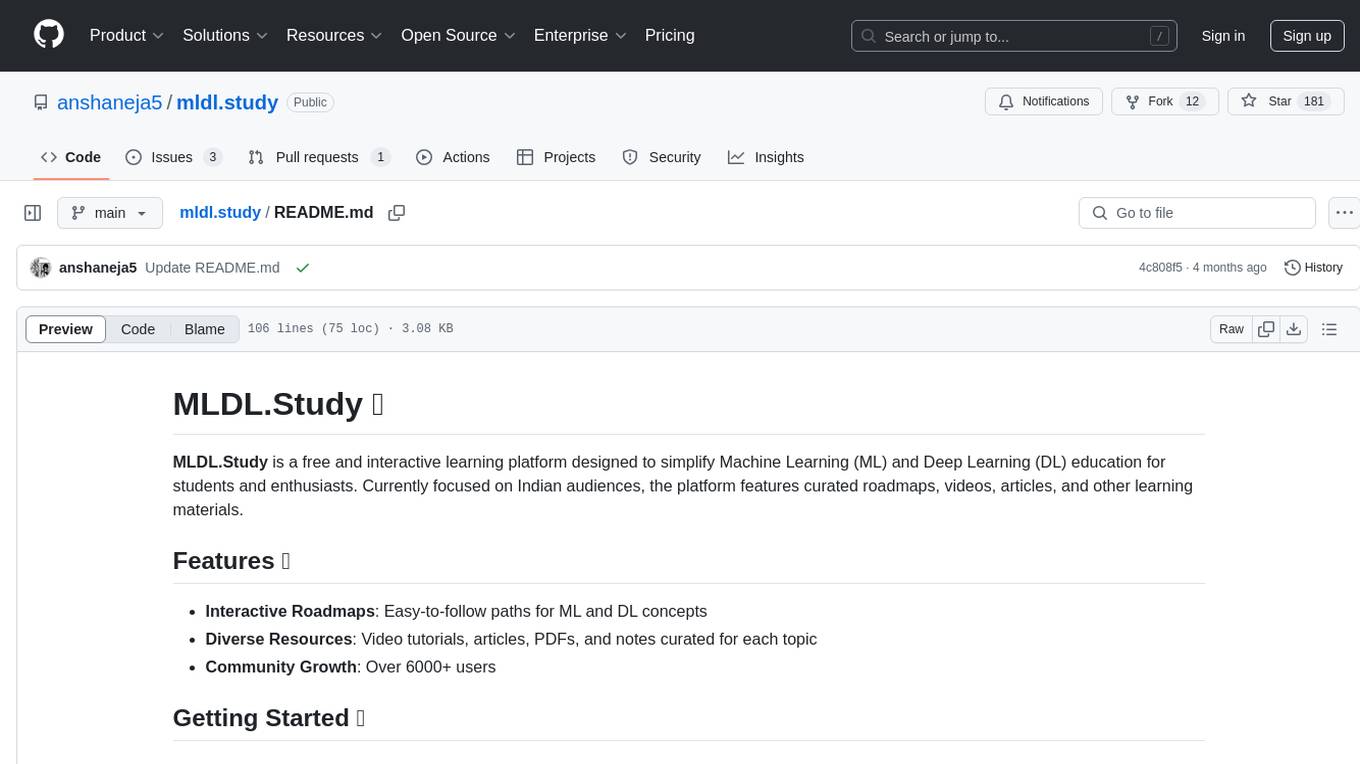
mldl.study
MLDL.Study is a free interactive learning platform focused on simplifying Machine Learning (ML) and Deep Learning (DL) education for students and enthusiasts. It features curated roadmaps, videos, articles, and other learning materials. The platform aims to provide a comprehensive learning experience for Indian audiences, with easy-to-follow paths for ML and DL concepts, diverse resources including video tutorials and articles, and a growing community of over 6000 users. Contributors can add new resources following specific guidelines to maintain quality and relevance. Future plans include expanding content for global learners, introducing a Python programming roadmap, and creating roadmaps for fields like Generative AI and Reinforcement Learning.
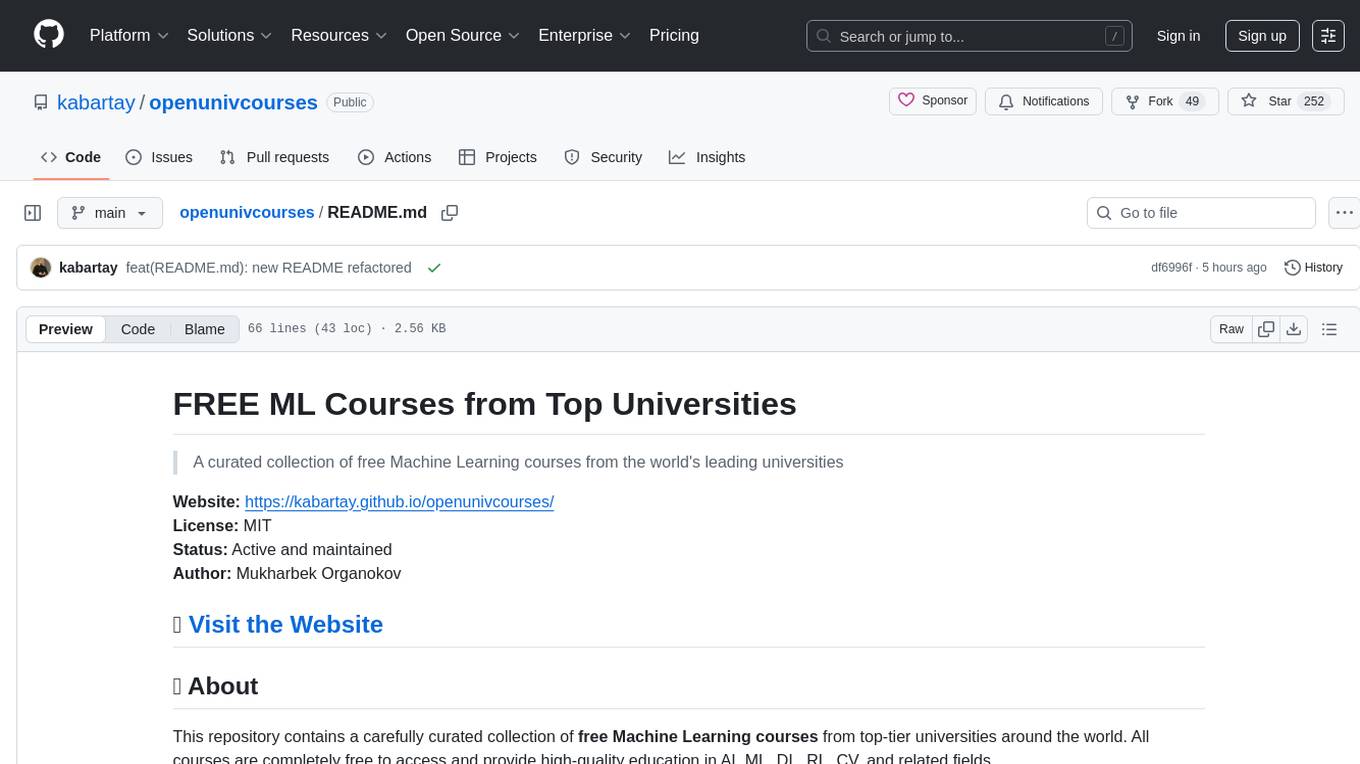
openunivcourses
OpenUnivCourses is a repository that provides free university courses in machine learning from top universities like MIT, Stanford, Berkeley, Carnegie Mellon, NYU, University of Michigan, University of Pennsylvania, University of Chicago, Purdue, Cornell, University of Oxford, and CalTech. The repository includes a wide range of courses covering topics such as deep learning, reinforcement learning, natural language processing, and more. Users can access lectures, notes, and videos from these prestigious institutions to enhance their knowledge and skills in the field of artificial intelligence and machine learning.
For similar jobs

weave
Weave is a toolkit for developing Generative AI applications, built by Weights & Biases. With Weave, you can log and debug language model inputs, outputs, and traces; build rigorous, apples-to-apples evaluations for language model use cases; and organize all the information generated across the LLM workflow, from experimentation to evaluations to production. Weave aims to bring rigor, best-practices, and composability to the inherently experimental process of developing Generative AI software, without introducing cognitive overhead.

LLMStack
LLMStack is a no-code platform for building generative AI agents, workflows, and chatbots. It allows users to connect their own data, internal tools, and GPT-powered models without any coding experience. LLMStack can be deployed to the cloud or on-premise and can be accessed via HTTP API or triggered from Slack or Discord.

VisionCraft
The VisionCraft API is a free API for using over 100 different AI models. From images to sound.

kaito
Kaito is an operator that automates the AI/ML inference model deployment in a Kubernetes cluster. It manages large model files using container images, avoids tuning deployment parameters to fit GPU hardware by providing preset configurations, auto-provisions GPU nodes based on model requirements, and hosts large model images in the public Microsoft Container Registry (MCR) if the license allows. Using Kaito, the workflow of onboarding large AI inference models in Kubernetes is largely simplified.

PyRIT
PyRIT is an open access automation framework designed to empower security professionals and ML engineers to red team foundation models and their applications. It automates AI Red Teaming tasks to allow operators to focus on more complicated and time-consuming tasks and can also identify security harms such as misuse (e.g., malware generation, jailbreaking), and privacy harms (e.g., identity theft). The goal is to allow researchers to have a baseline of how well their model and entire inference pipeline is doing against different harm categories and to be able to compare that baseline to future iterations of their model. This allows them to have empirical data on how well their model is doing today, and detect any degradation of performance based on future improvements.

tabby
Tabby is a self-hosted AI coding assistant, offering an open-source and on-premises alternative to GitHub Copilot. It boasts several key features: * Self-contained, with no need for a DBMS or cloud service. * OpenAPI interface, easy to integrate with existing infrastructure (e.g Cloud IDE). * Supports consumer-grade GPUs.

spear
SPEAR (Simulator for Photorealistic Embodied AI Research) is a powerful tool for training embodied agents. It features 300 unique virtual indoor environments with 2,566 unique rooms and 17,234 unique objects that can be manipulated individually. Each environment is designed by a professional artist and features detailed geometry, photorealistic materials, and a unique floor plan and object layout. SPEAR is implemented as Unreal Engine assets and provides an OpenAI Gym interface for interacting with the environments via Python.

Magick
Magick is a groundbreaking visual AIDE (Artificial Intelligence Development Environment) for no-code data pipelines and multimodal agents. Magick can connect to other services and comes with nodes and templates well-suited for intelligent agents, chatbots, complex reasoning systems and realistic characters.
